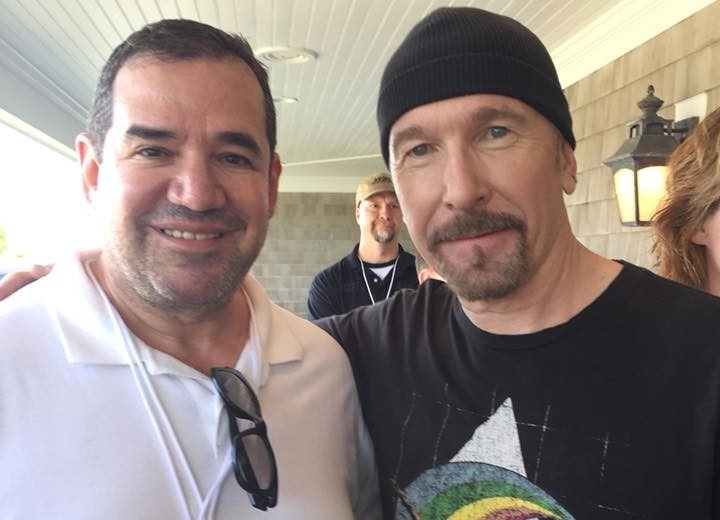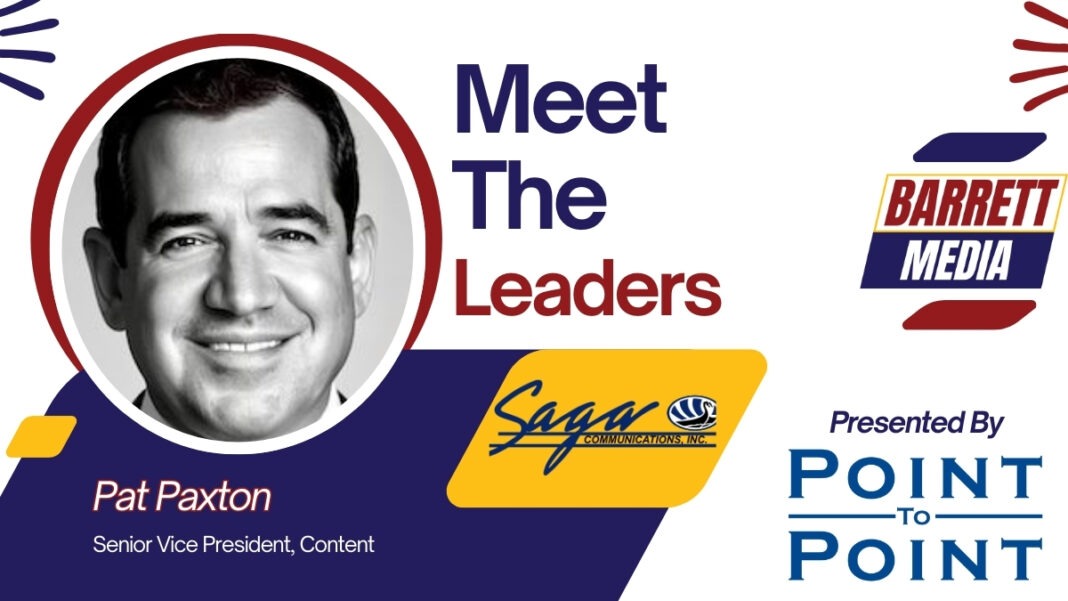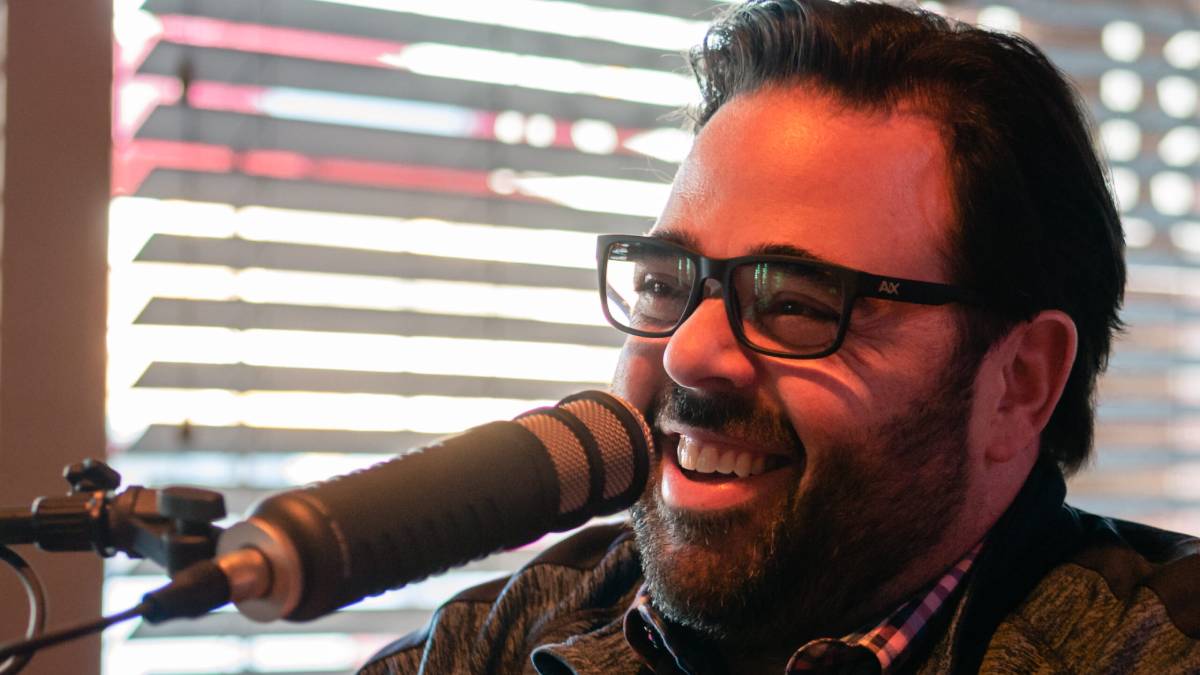We have been doing our “Meet the…” series in conjunction with Point-to-Point Marketing for a few years now. The latest iteration is called ‘Meet the Leaders,’ focusing on executives of audio companies across the spectrum. Given both his history and his current role, there may be no one better to start the series with than Saga Communications’ Senior VP of Content Pat Paxton.
Paxton took the role last year. He oversees stations in 28 markets across the country. The size of the markets makes his job very different than the one he held at Audacy until 2021.
Saga is a company focused on delivering relevant local content in smaller markets than the ones some of the bigger conglomerates in the radio business lust after. Paxton is adamant that doesn’t mean his team at Saga is any less talented or knowledgeable.
In our conversation, we touch on the future of the programming role, how digital buys are changing, and what he would say to potential advertisers questioning radio’s relevance in 2024. All of that is just the tip of the iceberg though.
Demetri Ravanos: How has your role changed since you first started overseeing programing at a corporate or national level? Now that the position is called VP of Content, that seems to encompass a whole lot more than it used to.
Pat Paxton: It’s a lot more than it used to be, but in many ways, it’s the same as it used to be at the end of the day. Our job is to create premium content that attracts consumers. That part hasn’t changed.
The difference, the changes obviously, have been the advent of digital, the advent of social, the advent of mobile, the advent of all the different distribution channels, and the advent of all the new competition. I mean Amazon, Spotify, Apple, etc. We have to be better than we used to be. We’ve also dealt with the technological changes that give us the opportunity to broadcast anywhere, anytime from any device. Which is a huge advantage for us and one that we’re still working to take full advantage of.
DR: So, with those new digital competitors, especially things like Spotify and Amazon offering people whatever it is they may want the second they want it, how does that change the way that radio is pitched – be it potential advertisers or even to listeners? What are you emphasizing that is available on radio that isn’t on those digital products?
PP: Well, radio can be a number of things. It could be a music concierge. Radio goes through all the music out there and chooses the best songs, so the consumer doesn’t have to. There used to be a thing called owned playlists. They’re way down on the list of listening because people get tired of listening to their own playlist. They want something fresh and something different, and the way that they learn about new music is by listening to the radio. So that part of radio, the music discovery side of things, hasn’t changed.
Another thing is that at Saga we serve our local communities. We talk about what’s going on in our communities. We are the number one source for local information in our communities. That’s something that none of the pure plays could ever do, and that’s one of the things that makes us so different, so unique and so attractive to the people in the areas that we serve.
DR: I wanted to hit on that very thing. I would like to know a little bit about how you operate at a national level, because all of the company’s web presence really gives the impression that the local markets have a lot of autonomy. So how do you go about working with the leaders in those markets to make sure everything is fitting into the ideals and strategies that corporate has in mind?
PP: Communication. It’s just talking. It’s the local markets understanding what the corporate initiatives are and corporate understanding what local needs to do to be successful and then helping them. It’s a servant type of leadership. Our radio markets make the money and we’re there to help them do well. We’re there to help them build audiences, build revenue and take full advantage of the marketplace that they’re in.
There are certainly corporate initiatives too that the markets take part in, and there’s certainly expertise in the local markets that corporate needs to listen to. It’s a mixture of both, and it’s communication that keeps it all meshing together.
DR: You have worked a lot in the type of role you’re in now. When you’re coming from somewhere like an Audacy or Entercom you’re used to working with large and major markets. Was there anything you needed to learn or rethink in order to be an effective leader for a company like Saga that has a lot of smaller market stations?
PP: One thing that really surprised me is how good the smaller markets are. Obviously, I was working in the larger markets and so I didn’t have a lot of time to pay attention to some of the smaller markets. Getting to know the people, the programmers, the talent, getting to sit and talk strategy with the market managers and the program directors really was an eye-opening experience for me. These are really, really smart people.
These radio stations are programed extremely well. They’re hitting at the center of the marketplace that they serve way more so than what I had been involved with before. That makes them really special and unique.
Where we compete against other radio broadcasters and certainly against pure plays, there are very few that can out-local us. That’s our unique calling card and that’s what will continue to be our specialty.

DR: We’re in this time where everyone in the media business, regardless of what your platform is, they’ve seen ad dollars shrink. And I wonder if, because you are working in markets where that local buy is so important, are there strategies beyond cost cutting that seem worthwhile to you? There are fewer ad dollars out there so what are you talking about with your stations to make sure their product is the most appealing to advertisers?
PP: There are fewer dollars going to terrestrial radio, but huge dollars are available to us. The digital market is a massive opportunity for the radio industry.
I think every company out there is making a big play into digital to help supplement some of the dollars that aren’t spent in radio anymore. We’re no different with our digital platforms and multiple digital initiatives.
DR: When you say mixed digital assets, are you talking about offerings beyond just putting ads on the web stream or in front of podcasts?
PP: Yeah, I mean our mobile assets, our apps, our social media assets, taking advantage of search and all of the different tools out there that clients need to be successful in today’s marketplace.
DR: So I want to wrap by asking you a question that we kind of touched on a little bit earlier, but in your role, like for years, people have viewed the idea of a VP of Programing or VP of Content, whatever the title may be, as almost a threat or a sign that the local programing positions may be someday eliminated.
You did a really good job of outlining why local bodies are important, but you look at some of these music formats where the hits are the hits, and I don’t think it’s crazy to wonder if programming at the local level may disappear. Tell me why I’m wrong.
PP: The hits are the hits, but the music is just one aspect of programming and executing a great local radio station. Relating to our local audiences isn’t going to happen by just playing music. We need people to do that. Local people. There is so much that goes into programming great local radio. We couldn’t do it without great local talent at every level.
DR: So what about when it comes to talk formats? In those formats, sports in particular, and news as well, the programing role on the local level becomes much more about coaching talent than it does about picking the content.
PP: I think for spoken word, you look at syndicated and local talent, and you’re going to see local talent outperform syndicated almost every time. That doesn’t mean there aren’t some great syndicated talent out there. There certainly are. But I know with all of our talk stations, which are a mix of syndicated and local talent, our local talent outperforms syndicated.
To learn more about Point-To-Point Marketing’s Podcast and Broadcast Audience Development Marketing strategies, contact Tim Bronsil at tim@ptpmarketing.com or 513-702-5072.

Demetri Ravanos is a columnist and features writer for Barrett Media. He is also the creator of The Sports Podcast Festival, and a previous host on the Chewing Clock and Media Noise podcasts. He occasionally fills in on stations across the Carolinas in addition to hosting Panthers and College Football podcasts. His radio resume includes stops at WAVH and WZEW in Mobile, AL, WBPT in Birmingham, AL and WBBB, WPTK and WDNC in Raleigh, NC.
You can find him on Twitter @DemetriRavanos or reach him by email at DemetriTheGreek@gmail.com.







